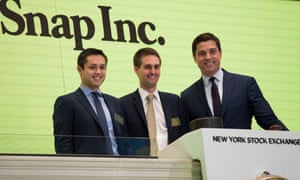How many Snapchat clones does it take for Facebook to lose its self-respect?
It must be getting hard to walk into work at Facebook with your head held high. You roll into the campus in your Tesla, waltz over to your desk, and sit down, head full of ideas as to how to make the social network better for users and advertisers alike. Then a notification pings up on Messenger. It’s Mark Zuckerberg himself! The boss is speaking to you! What could he have to say?
“Clone Snapchat a bit more. Thanks, Mark.”
Over the past year, Facebook has shown an almost monomaniacal dedication to taking on Snapchat by importing its defining features wholesale into the company’s own apps. Facebook Live has “masks” now (think Snapchat’s Lenses). Instagram has geostickers (like Snapchat’s location-aware stickers.) WhatsApp has “Status” (think Snapchat Stories). Instagram has “Stories” (think … Snapchat stories).The latest fruit of Facebook’s labours is Messenger Day – “a way for you to share these photos and videos — as they happen — by adding to your Messenger Day, where many of your friends can view and reply to them”. It’s Snapchat Stories. Again.
On top of the Stories clone comes a fully fledged Snapchat clone: Booting
into the camera in Messenger now brings up an interface which is “Snapchatesque” in the same way that The Bootleg Beatles are heavily influenced by the works of Lennon and McCartney. You can take a picture, scribble over it, then send it as a message to your contacts or add it to your Day.
Announcing the feature, Facebook’s Tony Leach gave a cringeworthy interview to TechCrunch in which he discusses how Messenger evolved into a “Chat Camera”. I’ve not heard a more obvious attempt to rewrite corporate history since Microsoft refused to acknowledge the iPod in its attempt to branch out into podcasting (“The term podcast is a combination of pod (Portable On Demand) and broadcast,” it helpfully told Windows Vista users in 2009). The interview spends more time acknowledging AOL instant messenger, a 20-year-old chat program, than it does discussing Snapchat.
This is backsliding even for Facebook. When Instagram cloned Stories, in mid 2016, its chief executive Kevin Systrom did at least acknowledge that the format had been invented by his competitor, but argued that it was bound to become more universal. He told the Verge: “Just like when Facebook invented the [News] Feed, and every social product was like, ‘That’s an innovation, how do we adapt that to our network,’ you’re going to see stories pop up in other networks over time, because it’s one of the best ways to show visual information in chronological order.”
The rot starts at the top. Even if Mark Zuckerberg isn’t directly commanding the creation of Snapchat clones, it’s clearly something he cares strongly about. In 2012, when Facebook built its first ever clone, Poke, it boasted that the app took only 12 days to create. Practice makes perfect, clearly, because the app flopped. By 2014, Zuckerberg was spinning that Poke was “more of a joke” than a real app, telling Businessweek that “a few people built it in a hackathon thing … and then just kind of abandoned it.”
The jokes continued, though. Later in 2014, Facebook released a second clone, Slingshot, which also died on its feet. In between, of course, the company tried a more direct approach, making a $3bn acquisition attempt which Snapchat rebuffed.
By October 2016, when I started tracking it, Facebook had made some sort of attempt to usurp Snapchat 10 times. By February, it was 17; the launch of Messenger Day takes it to 18.
And sure, some of those may be a stretch – disappearing messages have a strong role in the operations security of an encrypted messaging app, for instance, which is probably why the feature made it into Messenger’s end-to-end encrypted mode – but the overall trend is unmistakeable. Facebook feels no shame at all at the steady downgrade of its product team from groundbreaking designers to photocopier operators.
There’s two ways to look at that change. One is that this is the outcome of Facebook’s no-nonsense approach to business, and the very reason why the company is on top of the world. In that reading, Mark Zuckerberg has become the Simpson’s parody of Bill Gates, laughing as his goons smash up Homer Simpson’s computer equipment to put another competitor out of business. This Facebook plays dirty to stay on top, and doesn’t care whether or not you like it.
The other possibility is that Facebook is scared. It’s seen potential threats on the horizon before, but its chequebook has always been enough to ward off real danger: that’s why it bought Instagram, that’s why it bought WhatsApp, and that’s why it tried to buy Snapchat.
But it couldn’t get the company’s fiercely independent co-founder, Evan Spiegel, to sell. And now it’s in uncharted waters, with a competitor stealing advertising revenue, desirable millennial users, and industry credibility, and with no obvious way to reverse that trend.
Even if Facebook is lashing out in fear, that doesn’t mean it won’t be successful. A wild animal is at its most dangerous when cornered, after all. But it’s hard to sit in your open-plan office in Menlo Park feeling like a master of the universe while secretly shitting yourself about what’s going on 400 miles south in Venice Beach.
Facebook’s time at the top probably isn’t up. But it’s self-respect deficit is going to take years to pay off.



Comments
Post a Comment